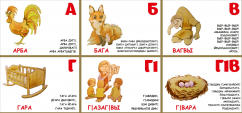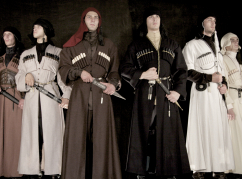WAC web information portal developed and launched an online project that will help to learn the Abkhazian and Abaza languages.
WAC launched an online project for learning the native language “We Speak Abkhazian / We Speak Abaza”. One of the main tasks of the new project is to reach a wide audience and enable all representatives of the Abkhaz-Abaza Diaspora to learn their native language, regardless of their location.
Representatives of the Abkhaz-Abaza people today live in more than 50 countries of the world. This is a single ethnic group with a single language and traditions dating back centuries.
According to Mussa Ekzekov, Chairman of the Supreme Council of the WAC, in the context of modern globalization, maintaining ethnic values, ancient traditions and a rich language as a whole is becoming increasingly difficult.
“That is why one of the most important goals of the WAC is the preservation and development of the native language as the basis for the preservation of the Abaza people. Since 2017, the WAC team has been actively promoting the development of the mother tongue in the countries of residence of the Diaspora. In places where councils of local and regional branches of the WAC are opened, clubs for the study of the native language and national dances are opened. So, for example, it was done in St. Petersburg and Moscow,” he recalled.
Details about the online project were told by the head of the Congress web information portal, the author of the idea, Amina Lazba.
“One of the main activities of the WAC is the preservation and development of the Abkhazian and Abaza languages. Therefore, the idea of a language project on the pages of the Congress information portal arose long ago, but due to various circumstances it was not possible to implement it. I wanted to create something rather simple, but at the same time allowing me to unobtrusively, in a playful way, teach users of our social networks simple phrases and sentences in their native language. So the project “We speak Abkhazian / We speak Abaza” came to life,” said Lazba.
According to her, the main difficulty was to come up with a format that would not only teach two languages - Abkhazian and Abaza, but would be accessible to representatives of the Abkhaz-Abaza Diaspora, living in different countries of the world and speaking different languages.
“Our users from today will be able to download short video lessons daily with simple, easy-to-remember phrases and sentences in two languages with translation into the other four languages - English, Arabic, Russian and Turkish,” Lazba explained.
Every day on weekdays, the WAC infoportal will publish one video lesson with three to five phrases and sentences, and at the end of each month prepare general material on the lessons learned over the past month.
“We also created the World Abaza Congress ABK / ABQ channel specifically for this project on Telegram so that users can follow only the updates of this project and can easily find the video lessons they are interested in,” added Amina Lazba.
She said that the project was created by the joint efforts of the WAC web information portal team and compatriots in different countries on a voluntary basis.
So, the training material was based on the work of the representative of the Circassian Diaspora from the USA, Jonti Yamisha, who has been developing language programs for many years and launched the Optilingo mobile application for teaching 20 languages, including the Kabardian language. Yamishi provided the project with a database of phrases and sentences in English for free, which cover more than 3,500 words, which is 95% of the common phrases and sentences used in everyday speech. This base has been developed by professional linguists for several years.
“The translators of the Congress web information portal, our compatriots, also decided to participate in the project for free. Philologist Alina Ajiba, who lives in Moscow, works with the Abkhazian language, philologist Bilyal Khasarokov from the KChR with the Abaza language, philologist Elis Argun from Turkey with the Turkish language, Artur Gaguliia, the diplomat, an employee of the Abkhazian Foreign Ministry with English and a repatriate from Syria, the journalist Mohamed Kuashba with Arabic,” said the head of the information portal of the WAC.
Phrases and sentences in the Abaza language are also voluntarily voiced by a journalist, the head of the information and analytical department of the ANO “Alashara” Georgy Chekalov, in Abkhazian - Amina Lazba herself. The design of the video tutorials was done by the videographer, director of the information portal Ilona Khvartskiya.
“I want to thank everyone who makes this project with us. I really hope that it will be a useful help in learning the native language for our compatriots around the world. I want to encourage them to send their videos with learned phrases and sentences from our lessons, which we will also publish on our pages,” summed up Amina Lazba.
The project is designed for two years, after which it can be complicated: users will be taught full-fledged dialogs in the Abkhazian and Abaza languages.
The study and development of the Abkhazian and Abaza languages is one of the main areas of work of the World Abaza Congress. The WAC devotes a significant part of its work to this area of activity, opening courses on the study of the mother tongue in the countries of residence of the Abkhaz-Abaza Diaspora, supporting linguistic scholars who are involved in the preservation and development of the Abkhaz and Abaza languages.
Here you can subscribe to the World Abaza Congress ABK / ABQ project channel.



to login or register.